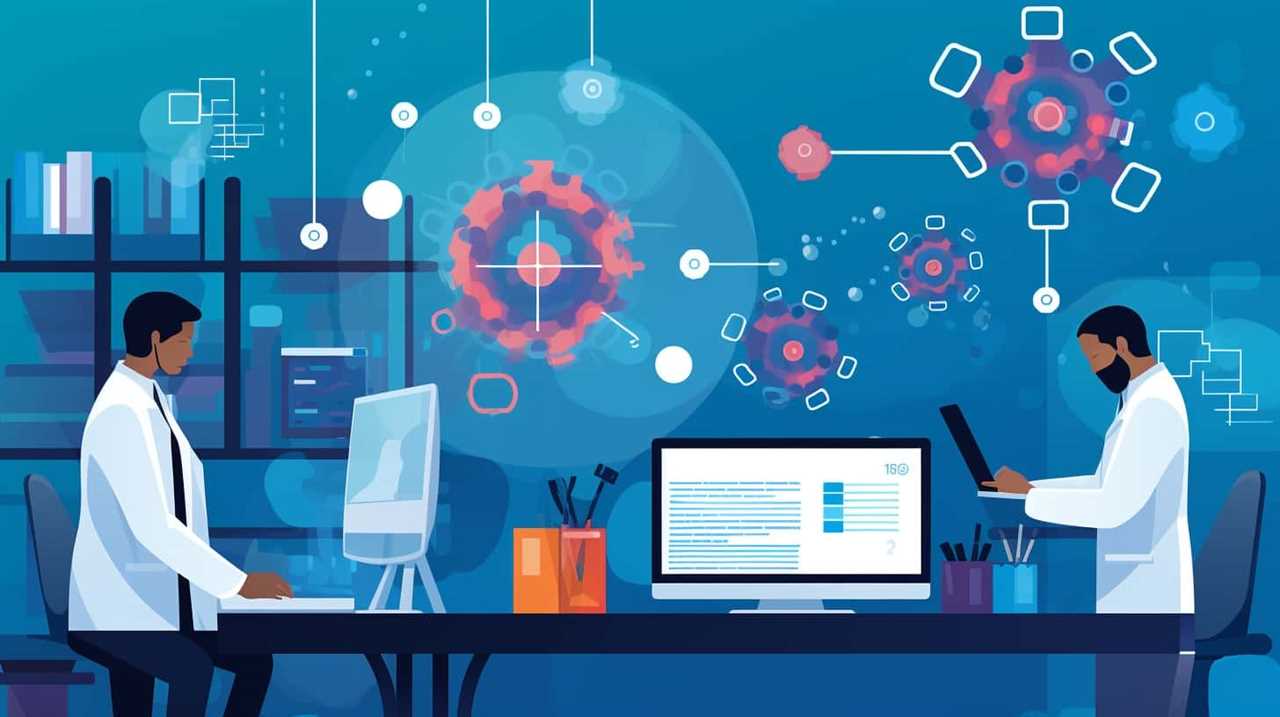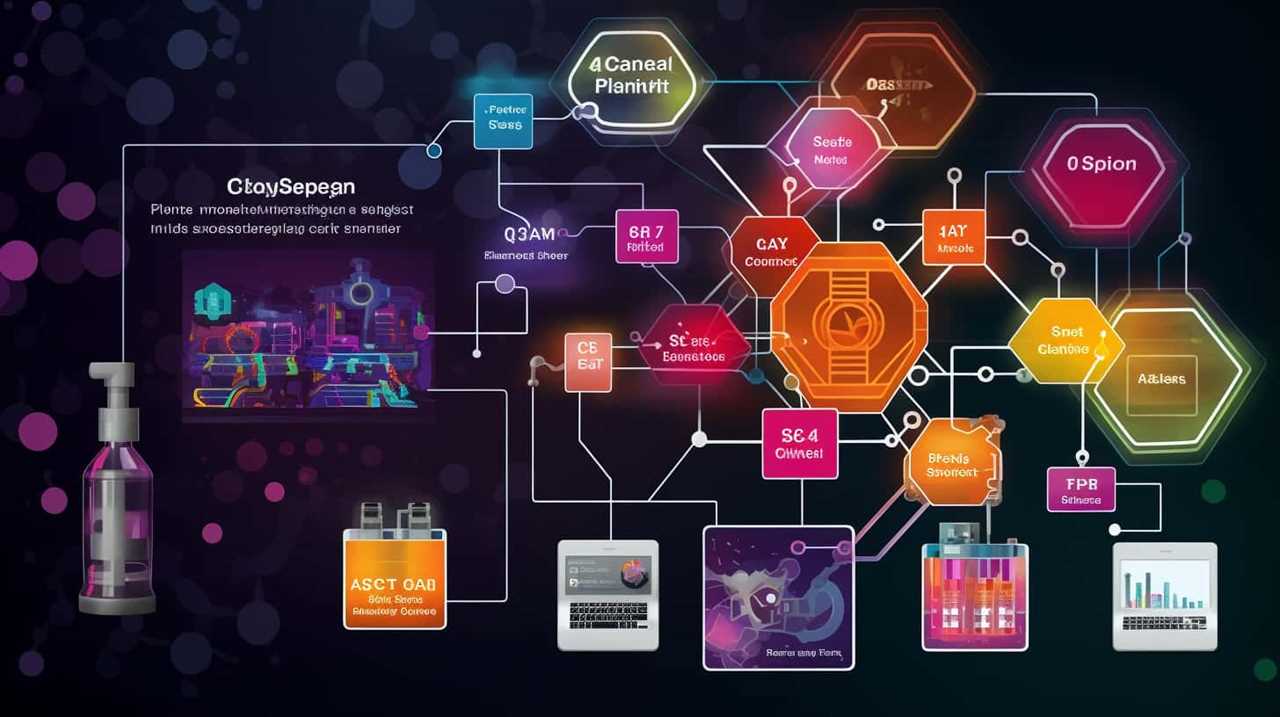Imagine having the ability to peer into the future, empowering us to confidently make informed decisions for our small business. This is indeed possible by utilizing predictive analytics! By leveraging the data at our disposal, we can reveal valuable insights, recognize patterns, and anticipate customer behavior.
Small business owners are gaining a crystal ball, armed with the ability to make data-driven decisions that lead to success. In this article, we explore the transformative impact of predictive analytics and its benefits for small business owners.
Key Takeaways
- Predictive analytics enables small business owners to make informed decisions and anticipate future outcomes.
- It harnesses vast amounts of data to provide actionable insights and identify patterns and trends.
- Implementing predictive analytics can improve decision making, increase profitability, and optimize operations.
- Success stories of predictive analytics in small businesses include improved customer retention, increased sales revenue, and decreased costs.

The Power of Predictive Analytics
With the power of predictive analytics, we can make informed decisions and anticipate future outcomes. This technology enables us to harness the vast amount of data available to us and transform it into actionable insights.
By analyzing historical data and identifying patterns and trends, we gain a deeper understanding of our business and customers. This knowledge allows us to improve decision making, as we can identify potential risks and opportunities well in advance.
Additionally, predictive analytics helps us increase customer satisfaction by enabling us to personalize our offerings and anticipate their needs. By leveraging this powerful tool, we can tailor our products and services to meet individual preferences, resulting in higher levels of customer loyalty and engagement.
Ultimately, the power of predictive analytics empowers us to make data-driven decisions that drive business success and enhance customer satisfaction.

How Predictive Analytics Works
Predictive analytics works by analyzing historical data and identifying patterns and trends to make informed decisions and anticipate future outcomes. Here is a breakdown of how predictive analytics works:
- Data collection: The first step is to gather relevant data from various sources, such as customer records, sales data, and market trends.
- Data preprocessing: This involves cleaning and organizing the data to ensure accuracy and consistency.
- Predictive modeling techniques: Using statistical algorithms and machine learning, predictive models are built to identify patterns and relationships within the data.
- Data-driven decision making: With the predictive models in place, businesses can use the insights gained to make informed decisions and drive their strategies.

Benefits for Small Business Owners
By harnessing the power of predictive analytics, small business owners can gain valuable insights and make data-driven decisions to drive growth and profitability. Predictive analytics provides numerous benefits for small business owners, helping them improve decision making and increase profitability. With the ability to analyze vast amounts of data, predictive analytics enables businesses to identify patterns, trends, and correlations that may not be apparent through traditional analysis methods. This allows owners to make more informed decisions about pricing, inventory management, marketing strategies, and customer behavior. By leveraging predictive analytics, small business owners can optimize their operations, reduce costs, and identify new opportunities for growth. The table below highlights some of the key benefits of predictive analytics for small business owners:
| Benefits of Predictive Analytics |
|---|
| Improved decision making |
| Increased profitability |

Implementing Predictive Analytics
To successfully implement predictive analytics, we can start by gathering relevant data and analyzing it for insights that will drive informed decision making. But implementing predictive analytics comes with its own set of challenges. Here are four key steps to overcome these challenges and ensure a successful implementation:
- Define clear objectives: Clearly identify the business problems you want to solve with predictive analytics. This will help guide your data collection and analysis efforts.
- Data quality and integration: Ensure that you have high-quality data from multiple sources. Data integration is crucial for accurate predictions and insights.
- Choose the right tools: Select predictive analytics tools that align with your business needs and technical capabilities. Consider factors like ease of use, scalability, and compatibility with your existing systems.
- Train and educate your team: Provide adequate training to your employees to effectively utilize predictive analytics tools. Encourage a data-driven culture and foster collaboration between data analysts and business stakeholders.

Success Stories of Predictive Analytics in Small Businesses
Small business owners have witnessed remarkable achievements through the implementation of predictive analytics. By harnessing the power of data-driven insights, these businesses have been able to improve customer retention and optimize their inventory management. Let’s take a look at some success stories that highlight the transformative impact of predictive analytics in small businesses.
| Small Business | Achievement | Impact |
|---|---|---|
| Online Retailer | Used predictive analytics to identify potential churners and proactively engage them, resulting in a 15% increase in customer retention. | Improved customer loyalty and reduced customer acquisition costs. |
| Restaurant | Leveraged predictive models to optimize inventory levels and minimize waste, leading to a 20% decrease in food costs. | Enhanced profitability and reduced food waste. |
| E-commerce Startup | Implemented predictive analytics to forecast demand patterns and optimize inventory replenishment, resulting in a 30% reduction in stockouts. | Improved customer satisfaction and increased sales revenue. |
These success stories demonstrate how predictive analytics can empower small businesses to make data-driven decisions that drive growth, improve operational efficiency, and ultimately achieve long-term success.

Frequently Asked Questions
What Are the Limitations or Drawbacks of Using Predictive Analytics for Small Business Owners?
Limitations and drawbacks of predictive analytics for small business owners include potential inaccuracies, over-reliance on historical data, and the need for skilled analysts. However, with proper understanding and utilization, predictive analytics can greatly benefit small businesses.
Are There Any Specific Industries or Types of Small Businesses That Can Benefit the Most From Predictive Analytics?
Certain industries, such as retail and finance, can reap significant benefits from predictive analytics. Key factors for successful implementation include data quality, expertise in analytics, and a willingness to adapt to data-driven insights.
How Can Small Business Owners Ensure the Accuracy and Reliability of the Predictive Analytics Models?
To ensure accuracy and avoid biases in predictive analytics models, we can implement rigorous data validation processes, regularly update and refine the models, and conduct thorough testing and validation to ensure reliability.
What Are the Costs Associated With Implementing Predictive Analytics for a Small Business?
Cost considerations and implementation challenges are important factors to consider when small business owners implement predictive analytics. We must analyze the financial implications and overcome any obstacles to ensure successful integration of this powerful tool.
Are There Any Ethical Considerations or Potential Risks Involved in Using Predictive Analytics for Small Business Decision-Making?
Ethical considerations and potential risks are important when using predictive analytics for small business decision-making. We must carefully analyze the implications and ensure transparency and fairness in our data-driven processes.

Conclusion
In conclusion, predictive analytics has become an invaluable tool for small business owners. It provides them with a crystal ball to foresee future trends and make informed decisions. With its ability to analyze vast amounts of data, businesses can now accurately predict customer behavior, optimize marketing strategies, and identify potential risks and opportunities.
Studies show that small businesses using predictive analytics have seen a 20% increase in customer retention. This paints a vivid picture of the power and impact of this technology.









